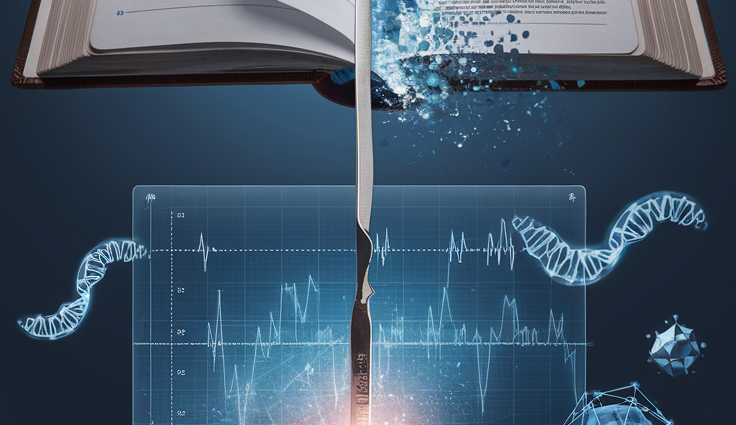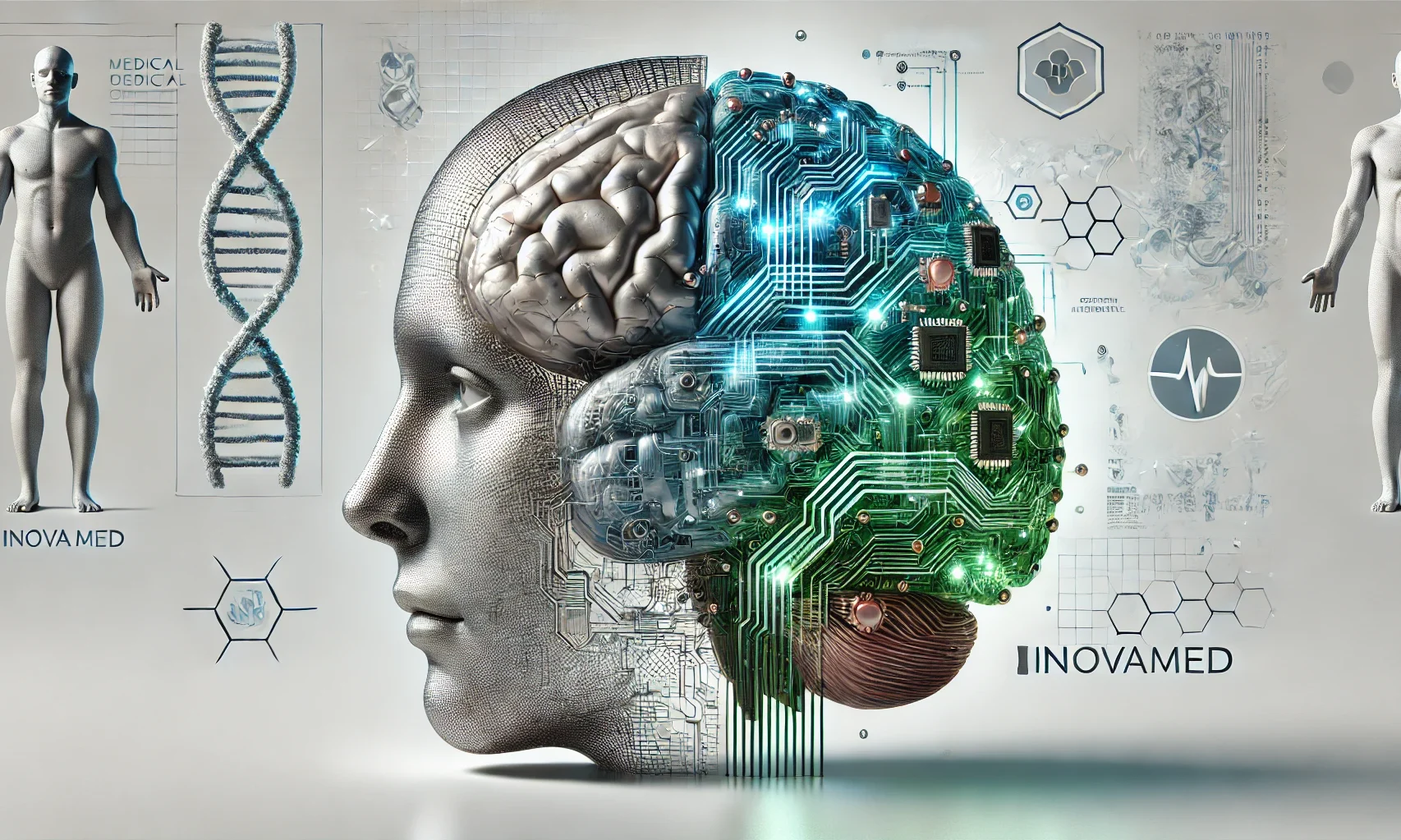
Beyond Algorithms: How Healthcare Professionals Could Redefine the Future of Medicine with AI |
超越算法:医疗保健专业人员如何可以重新定义人工智能在医学中的未来 |
Além dos Algoritmos: Como os Profissionais de Saúde Podem Redefinir o Futuro da Medicina com IA |
| Table of Contents |
Introduction: The Human Element in Medical AI
In today’s fast-evolving world of healthcare technology, artificial intelligence is emerging as a transformative tool that enhances, rather than replaces, human expertise. This article explores how AI can empower medical professionals by augmenting their decision-making and clinical insight. By embracing a collaborative approach between technology and human judgment, we can pave the way for more efficient, ethical, and patient-centered care.
This trilingual article is designed to spark dialogue among healthcare innovators around the globe, offering insights into current challenges, future opportunities, and the evolving role of AI in medicine.

Healthcare professionals working with AI systems represent the future of medical practice.
Current Landscape: Beyond the Hype
Artificial intelligence in healthcare has moved beyond theoretical applications to become an integral component of modern medical systems. AI tools are now embedded in various aspects of diagnostics, treatment planning, and administrative workflows. Yet, a significant gap still exists between technological capability and real-world implementation.
Key Areas Where AI is Transforming Healthcare
- Diagnostic Imaging: AI systems can detect patterns in radiological images that may escape human observation.
- Predictive Analytics: Algorithms can identify patients at risk before clinical symptoms appear.
- Administrative Efficiency: AI streamlines documentation, coding, and other administrative tasks.
- Drug Discovery: Machine learning accelerates the identification and validation of new therapeutic compounds.
- Personalized Medicine: AI helps tailor treatments based on individual genetic profiles and medical histories.
Challenges at the Intersection
The integration of AI into clinical practice presents multifaceted challenges that extend well beyond technical considerations. Healthcare professionals must address complex ethical dilemmas, navigate workflow disruptions, and adapt to evolving regulatory frameworks while ensuring that the human touch in medicine remains at the forefront.
Moreover, traditional medical education has yet to fully equip clinicians with the skills needed to interpret and critically evaluate AI-generated insights, further compounding the challenge of effective AI adoption.
Educational Imperatives for the AI Era
- Integration of data science and AI literacy into medical school curricula
- Continuing education for practicing clinicians on AI evaluation and implementation
- Development of specialized roles bridging clinical and technical domains
- Cross-disciplinary collaboration between medical and computational experts
- Patient education on the capabilities and limitations of healthcare AI
Redefining the Relationship
Moving forward, a fundamental reconceptualization of the relationship between healthcare professionals and AI is essential. Rather than viewing AI as a replacement, the focus should be on a collaborative model that leverages the complementary strengths of both human and machine intelligence.
In this model, clinicians not only use AI tools but also play a key role in their development and validation, ensuring that the technology supports patient care without compromising ethical standards.
Human Strengths
- Clinical intuition and pattern recognition
- Empathetic communication with patients
- Ethical decision-making in complex scenarios
- Adaptability to unique cases
- Integration of social and contextual factors
AI Strengths
- Processing vast quantities of medical literature
- Identifying subtle patterns in large datasets
- Consistent application of established protocols
- Continuous monitoring without fatigue
- Simultaneous analysis of numerous variables
The Future: Co-Evolution of Medicine and AI
The future of healthcare lies in the dynamic co-evolution of medical practice and artificial intelligence. This collaborative relationship will reshape clinical roles, educational models, and care delivery systems in profound and often unexpected ways.
Healthcare professionals will need to acquire new skills that bridge clinical expertise and technological fluency. In doing so, they will become adept at validating AI outputs, detecting biases, and applying computational insights within the clinical context.
AI-Native Clinicians
Future medical graduates will seamlessly integrate computational tools with patient care, critically assessing AI outputs from a clinical perspective.
Clinical AI Specialists
A new subspecialty will emerge focused on the development, validation, and implementation of AI tools tailored to specific medical domains.
Augmented Primary Care
AI will enhance relationship-based care by automating routine monitoring and allowing clinicians to focus on complex decision-making and patient interaction.
Conclusion: A Call to Action
The integration of artificial intelligence into healthcare presents not just a technological challenge but a profound opportunity to redefine the practice of medicine. Realizing this potential will require active collaboration between clinicians and technologists, ensuring that AI serves as an extension of human expertise.
Ultimately, the future of medicine will be shaped by those who embrace a collaborative, transparent approach to technology – one that upholds the values of compassion, equity, and patient-centered care.
Steps Toward Collaborative Intelligence
- Engage directly in the development and validation of AI systems in your specialty.
- Advocate for transparency in algorithmic decision-making and patient data usage.
- Invest in AI literacy through continuing education and cross-disciplinary collaboration.
- Document clinical outcomes of AI-augmented care to build an evidence base.
- Mentor the next generation of clinicians in the thoughtful integration of technology.
The future of medicine will be written by those who actively participate in its creation. By embracing a model where AI and human expertise work hand-in-hand, healthcare professionals can ensure that technology enhances, rather than replaces, the human touch in medicine.
引言:医疗人工智能中的人类元素
在当今快速演进的医疗技术领域,人工智能正以一种前所未有的方式改变着医疗实践。本文探讨了如何通过协作模式,使人工智能与临床专业知识相互补充,从而提升医疗服务的效率和质量。
本篇文章以三种语言呈现,旨在激发全球医疗创新者之间的交流与合作,共同探讨如何利用人工智能推动医疗实践的未来发展。

与人工智能系统合作的医疗专业人员代表了医疗实践的未来。
当前格局:超越炒作
人工智能已经从理论走向实践,成为现代医疗系统中不可或缺的一部分。但在技术能力与实际应用之间,依然存在明显的鸿沟。
人工智能正在变革医疗保健的关键领域
- 诊断成像: 通过对图像数据的智能分析,AI可以发现传统方法难以察觉的细微变化。
- 预测分析: AI算法能够在临床症状出现前识别潜在风险。
- 行政效率: 自动化文档和编码流程,提升医疗管理效率。
- 药物研发: 利用机器学习加速新药物的筛选与验证。
- 个性化医疗: 根据患者基因和病史数据,量身定制治疗方案。
交叉点的挑战
尽管人工智能展现出巨大潜力,但其在临床实践中的整合面临诸多挑战。医疗人员需同时应对伦理问题、工作流程中断和监管变化等复杂因素。
此外,传统医学教育尚未能充分培养医务人员解读和批判性评估AI结果的能力,这进一步加大了技术落地的难度。
人工智能时代的教育要务
- 将数据科学和AI素养纳入医学院课程
- 为在职医务人员提供持续的AI培训
- 构建跨领域协作桥梁,培养专业复合型人才
- 推动医学与计算机科学专家之间的跨学科合作
- 提升患者对AI能力和局限性的认知
重新定义关系
医疗界需要重新审视与人工智能的关系,打造一种既不依赖技术也不完全排斥技术的协作模式。医生应不仅作为用户使用AI工具,更应积极参与其开发和优化,以确保技术真正服务于患者福祉。
人类优势
- 临床直觉与模式识别
- 与患者的共情沟通
- 在复杂情境中的伦理决策
- 应对特殊或罕见情况的灵活性
- 整合社会及情境因素
人工智能优势
- 高效处理大量医学数据
- 识别大数据中的细微模式
- 严格执行既定的临床协议
- 不间断的监控能力
- 同时考虑多种变量
未来:医学与人工智能的共同演变
未来的医疗模式将建立在医学实践与人工智能共同演进的基础上。这种共生关系将彻底改变临床角色、教育模式和护理模式,为精准、预防和持续医疗提供可能。
未来的医务人员需要具备跨界技能,将临床经验与技术能力相结合,既能解读AI输出,又能参与技术的不断优化。
人工智能原生临床医生
未来的医学毕业生将能够灵活运用计算工具,与患者护理无缝结合,并以批判性视角评估AI结果。
临床人工智能专家
一个全新的专科将会出现,专注于为特定医学领域开发、验证和实施定制的AI工具。
增强型初级保健
通过自动化日常监控,AI将助力长期关系型护理,使医务人员能够专注于更复杂的临床决策与人际互动。
结论:行动呼吁
将人工智能融入医疗实践不仅是技术上的挑战,更是一场深刻变革的契机。实现这一潜力需要医疗专业人员与技术专家紧密合作,共同打造一个以患者为中心、透明且高效的医疗体系。
归根结底,未来的医疗将由那些拥抱协作与创新理念的人共同书写,只有当人工智能与人类智慧真正融合时,医疗服务的未来才能更加美好。
迈向协作智能的步骤
- 直接参与您专业领域的人工智能系统的开发与验证。
- 倡导透明确保算法决策与患者数据使用公开透明。
- 加强AI素养通过持续教育与跨学科合作提升技能。
- 记录临床成果建立基于数据的证据体系。
- 培养后继人才引导下一代医务人员高效整合技术。
医学的未来将由积极参与这一变革的人共同书写。只有当AI与人类专业知识协同作用时,才能实现技术与温情并存的医疗新纪元。
Índice
Introdução: O Elemento Humano na IA Médica
No cenário atual, onde a tecnologia avança a passos largos, a inteligência artificial surge como uma ferramenta revolucionária que complementa a expertise dos profissionais de saúde. Este artigo explora como a colaboração entre humanos e máquinas pode transformar a prática médica, melhorando a precisão dos diagnósticos e a eficiência dos tratamentos.
Através deste artigo trilingue, buscamos fomentar o diálogo e a reflexão sobre o papel do AI na medicina, apresentando desafios, oportunidades e os caminhos para uma integração efetiva da tecnologia na prática clínica.

Profissionais de saúde trabalhando com sistemas de IA representam o futuro da prática médica.
Panorama Atual: Além do Hype
A inteligência artificial na saúde ultrapassou as teorias e hoje se integra aos sistemas médicos, atuando em diagnósticos, planejamento de tratamentos e gestão administrativa. No entanto, a implementação prática ainda enfrenta desafios consideráveis.
Áreas-Chave Onde a IA Está Transformando a Saúde
- Imagens Diagnósticas: Análise inteligente de imagens radiológicas para identificar padrões imperceptíveis.
- Análise Preditiva: Identificação precoce de riscos antes do aparecimento dos sintomas clínicos.
- Eficiência Administrativa: Automatização de processos como documentação e codificação.
- Descoberta de Medicamentos: Aceleração na triagem e validação de novos compostos terapêuticos.
- Medicina Personalizada: Adaptação dos tratamentos com base em dados genéticos e históricos médicos.
Desafios na Interseção
Embora promissora, a implementação da IA na saúde enfrenta desafios multifacetados, que vão desde questões éticas e interrupções no fluxo de trabalho até barreiras regulatórias. Além disso, a formação médica tradicional ainda não capacita os profissionais para interpretar e avaliar criticamente os dados gerados por sistemas de IA.
Imperativos Educacionais para a Era da IA
- Integrar ciência de dados e alfabetização em IA nos currículos médicos
- Oferecer educação continuada para a prática clínica com foco em IA
- Desenvolver funções especializadas que unam os domínios clínicos e técnicos
- Promover a colaboração entre médicos e especialistas em tecnologia
- Educar os pacientes sobre as potencialidades e limitações da IA
Redefinindo o Relacionamento
O futuro da medicina exige uma nova visão da relação entre profissionais de saúde e inteligência artificial. Em vez de enxergar a tecnologia como substituta, é fundamental que ela seja vista como uma aliada que, juntamente com o conhecimento clínico, eleva a qualidade do atendimento.
Nesta abordagem colaborativa, os médicos não são apenas usuários de ferramentas tecnológicas, mas participantes ativos em seu desenvolvimento, garantindo que as inovações estejam alinhadas com as necessidades reais dos pacientes.
Forças Humanas
- Intuição clínica e reconhecimento de padrões
- Comunicação empática com pacientes
- Tomada de decisão ética em cenários complexos
- Flexibilidade diante de casos atípicos
- Integração de aspectos sociais e contextuais
Forças da IA
- Análise rápida de grandes volumes de dados
- Identificação de padrões sutis
- Execução consistente de protocolos
- Monitoramento contínuo
- Análise simultânea de múltiplas variáveis
O Futuro: Coevolução da Medicina e IA
O futuro da saúde será definido pela integração contínua entre a prática médica e a inteligência artificial. Essa coevolução promete remodelar papéis, modelos educacionais e a forma como os cuidados são prestados, promovendo uma abordagem mais precisa e preventiva.
Os profissionais do futuro precisarão combinar experiência clínica com habilidades tecnológicas avançadas, tornando-se aptos a validar e interpretar os dados gerados pelos sistemas de IA.
Clínicos Nativos em IA
Futuros médicos serão treinados para integrar ferramentas computacionais com a prática clínica, avaliando criticamente os resultados de forma holística.
Especialistas Clínicos em IA
Emergirá uma nova especialidade dedicada ao desenvolvimento e implementação de soluções de IA personalizadas para diversas áreas médicas.
Atenção Primária Aumentada
Com a automatização de tarefas rotineiras, a IA permitirá que os médicos se concentrem em decisões clínicas complexas e na relação com os pacientes.
Conclusão: Um Chamado à Ação
A integração da inteligência artificial na saúde não é apenas um desafio tecnológico, mas uma oportunidade transformadora para reimaginar a prática médica. Para que essa transformação seja bem-sucedida, é imprescindível que os profissionais de saúde adotem uma abordagem colaborativa e inovadora.
Somente unindo a expertise humana à capacidade analítica da IA poderemos criar um sistema de saúde que seja verdadeiramente eficiente, ético e centrado no paciente.
Passos Rumo à Inteligência Colaborativa
- Engaje-se diretamente no desenvolvimento e validação dos sistemas de IA na sua área.
- Defenda a transparência nas decisões algorítmicas e no uso dos dados dos pacientes.
- Invista em formação contínua sobre IA e em colaboração interdisciplinar.
- Documente os resultados dos cuidados aprimorados por IA para construir uma base sólida de evidências.
- Capacite a nova geração de profissionais para integrar tecnologia e prática clínica.
O futuro da medicina será escrito por aqueles que abraçarem essa transformação. Ao unir a inteligência artificial ao conhecimento humano, podemos criar um sistema de saúde mais robusto, inovador e, acima de tudo, humano.
